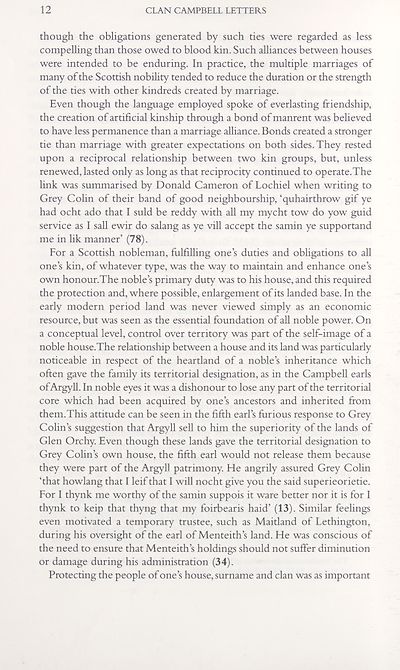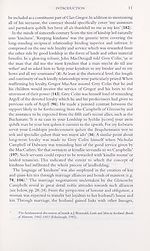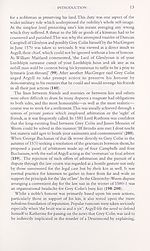Series 5 > Campbell Letters 1559-1583
(31) Page 12
Download files
Complete book:
Individual page:
Thumbnail gallery: Grid view | List view

12
CLAN CAMPBELL LETTERS
though the obligations generated by such ties were regarded as less
compelling than those owed to blood kin. Such alliances between houses
were intended to be enduring. In practice, the multiple marriages of
many of the Scottish nobility tended to reduce the duration or the strength
of the ties with other kindreds created by marriage.
Even though the language employed spoke of everlasting friendship,
the creation of artificial kinship through a bond of manrent was believed
to have less permanence than a marriage alliance. Bonds created a stronger
tie than marriage with greater expectations on both sides. They rested
upon a reciprocal relationship between two kin groups, but, unless
renewed, lasted only as long as that reciprocity continued to operate.The
link was summarised by Donald Cameron of Lochiel when writing to
Grey Colin of their band of good neighbourship, ‘quhairthrow gif ye
had ocht ado that I suld be reddy with all my mycht tow do yow guid
service as I sail ewir do salang as ye vill accept the samin ye supportand
me in lik manner’ (78).
For a Scottish nobleman, fulfilling one’s duties and obligations to all
one’s kin, of whatever type, was the way to maintain and enhance one’s
own honour.The noble’s primary duty was to his house, and this required
the protection and, where possible, enlargement of its landed base. In the
early modern period land was never viewed simply as an economic
resource, but was seen as the essential foundation of all noble power. On
a conceptual level, control over territory was part of the self-image of a
noble house.The relationship between a house and its land was particularly
noticeable in respect of the heartland of a noble’s inheritance which
often gave the family its territorial designation, as in the Campbell earls
of Argyll. In noble eyes it was a dishonour to lose any part of the territorial
core which had been acquired by one’s ancestors and inherited from
them.This attitude can be seen in the fifth earl’s furious response to Grey
Colin’s suggestion that Argyll sell to him the superiority of the lands of
Glen Orchy. Even though these lands gave the territorial designation to
Grey Colin’s own house, the fifth earl would not release them because
they were part of the Argyll patrimony. He angrily assured Grey Colin
‘that howlang that I leif that I will nocht give you the said superieorietie.
For I thynk me worthy of the samin suppois it ware better nor it is for I
thynk to keip that thyng that my foirbearis haid’ (13). Similar feelings
even motivated a temporary trustee, such as Maitland of Lethington,
during his oversight of the earl of Menteith’s land. He was conscious of
the need to ensure that Menteith’s holdings should not suffer diminution
or damage during his administration (34).
Protecting the people of one’s house, surname and clan was as important
CLAN CAMPBELL LETTERS
though the obligations generated by such ties were regarded as less
compelling than those owed to blood kin. Such alliances between houses
were intended to be enduring. In practice, the multiple marriages of
many of the Scottish nobility tended to reduce the duration or the strength
of the ties with other kindreds created by marriage.
Even though the language employed spoke of everlasting friendship,
the creation of artificial kinship through a bond of manrent was believed
to have less permanence than a marriage alliance. Bonds created a stronger
tie than marriage with greater expectations on both sides. They rested
upon a reciprocal relationship between two kin groups, but, unless
renewed, lasted only as long as that reciprocity continued to operate.The
link was summarised by Donald Cameron of Lochiel when writing to
Grey Colin of their band of good neighbourship, ‘quhairthrow gif ye
had ocht ado that I suld be reddy with all my mycht tow do yow guid
service as I sail ewir do salang as ye vill accept the samin ye supportand
me in lik manner’ (78).
For a Scottish nobleman, fulfilling one’s duties and obligations to all
one’s kin, of whatever type, was the way to maintain and enhance one’s
own honour.The noble’s primary duty was to his house, and this required
the protection and, where possible, enlargement of its landed base. In the
early modern period land was never viewed simply as an economic
resource, but was seen as the essential foundation of all noble power. On
a conceptual level, control over territory was part of the self-image of a
noble house.The relationship between a house and its land was particularly
noticeable in respect of the heartland of a noble’s inheritance which
often gave the family its territorial designation, as in the Campbell earls
of Argyll. In noble eyes it was a dishonour to lose any part of the territorial
core which had been acquired by one’s ancestors and inherited from
them.This attitude can be seen in the fifth earl’s furious response to Grey
Colin’s suggestion that Argyll sell to him the superiority of the lands of
Glen Orchy. Even though these lands gave the territorial designation to
Grey Colin’s own house, the fifth earl would not release them because
they were part of the Argyll patrimony. He angrily assured Grey Colin
‘that howlang that I leif that I will nocht give you the said superieorietie.
For I thynk me worthy of the samin suppois it ware better nor it is for I
thynk to keip that thyng that my foirbearis haid’ (13). Similar feelings
even motivated a temporary trustee, such as Maitland of Lethington,
during his oversight of the earl of Menteith’s land. He was conscious of
the need to ensure that Menteith’s holdings should not suffer diminution
or damage during his administration (34).
Protecting the people of one’s house, surname and clan was as important
Set display mode to:
![]() Universal Viewer |
Universal Viewer | ![]() Mirador |
Large image | Transcription
Mirador |
Large image | Transcription
Images and transcriptions on this page, including medium image downloads, may be used under the Creative Commons Attribution 4.0 International Licence unless otherwise stated. ![]()
| Scottish History Society volumes > Series 5 > Campbell Letters 1559-1583 > (31) Page 12 |
|---|
| Permanent URL | https://digital.nls.uk/128288164 |
|---|
| Description | Over 180 volumes, published by the Scottish History Society, containing original sources on Scotland's history and people. With a wide range of subjects, the books collectively cover all periods from the 12th to 20th centuries, and reflect changing trends in Scottish history. Sources are accompanied by scholarly interpretation, references and bibliographies. Volumes are usually published annually, and more digitised volumes will be added as they become available. |
|---|


